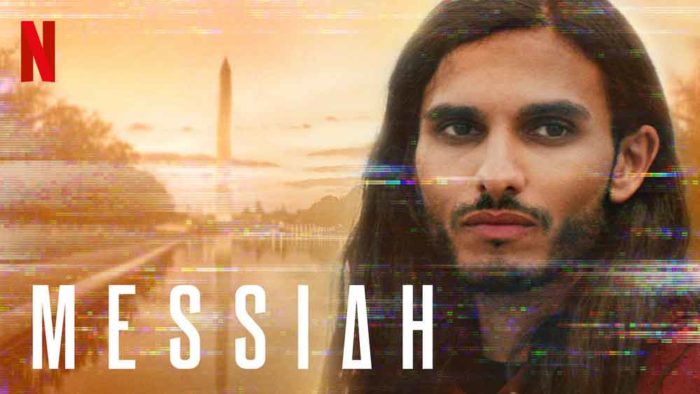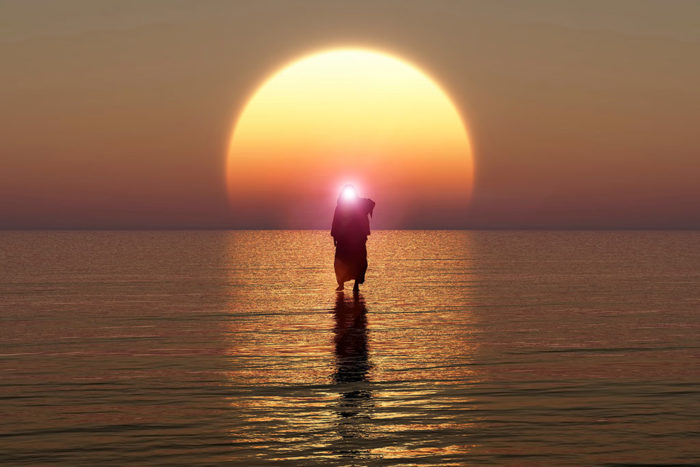Do You Believe?
I recently watched the first season of the new Netflix drama Messiah, a multi-language series that depicts the mysterious arrival of a man named al-Masih who claims to be the Word of God. He causes a few significant social disruptions and demonstrates seemingly uncanny abilities, and thanks to social media, he quickly goes “viral” and gains an eager following of people desperate for hope. As any good show will do, the scriptwriters don’t make things entirely clear as to whether al-Masih is a messiah, a con artist, or something else entirely. There are definitely a few “whoa” moments that will make you think that he might be the real deal, but the hard-nosed law enforcement and intelligence agencies on his tail frequently uncover new information that throw everything into doubt.

Image copyright Netflix
SPOILER ALERT: about two-thirds of the way through the season, we see what becomes the marquee moment for al-Masih and his message. He gives an impassioned speech in front of the Lincoln Memorial and then turns and walks across the reflecting pool towards the Washington Monument as hundreds of smartphones capture the event. There is an obvious parallel with Jesus, and while al-Masih never claims to be the Son of God directly, he does describe himself as “the Word”. Despite being Middle Eastern with an Arabic name, al-Masih never claims to be Muslim. He makes his first appearance in Damascus, and then in Jerusalem, and then he inexplicably arrives in Texas where a tornado has destroyed an entire town, leaving only the church building still standing. He forms a friendship with the downtrodden pastor who helps him get to Washington D.C. where his miracle is performed. It’s curious to see how al-Masih seems to be making a concerted effort to draw parallels between himself and Jesus, rather than with Mohammed or Abraham.
Walking on water is nothing new for illusionists. Criss Angel walked across a pool full of guests in Mindfreak, and a quick YouTube search reveals how he did it (clear plastic pillars set at water level). In the TV show Messiah, skeptics go on television after the “miracle” and denigrate it as just an illusion. We don’t see anything more than fleeting glimpses of his watery stroll, and in real life, someone would probably have jumped in after him to see if he was walking on a solid surface, thereby immediately disproving the miracle. Alas, this is television and people don’t act entirely rational all the time, so we are left to keep guessing along with the characters. But it got me thinking: what kind of miracle would it take for people these days to truly believe?
In ages past, photos and videos were hard evidence, but in the age of Photoshop and deepfakes, we can’t trust anything we see on the screen anymore. And while illusionists have been around for thousands of years, modern technology makes these stunts and spectacles even more incredible (some of the illusions on Criss Angel’s Mindfreak have completely blown my mind). Yet even if we can’t figure them out, we know they are fake. Criss Angel maintains that everything he does is an illusion, which means it has a rational explanation. If someone came along claiming to have supernatural power, we would likely dismiss them off-hand because we would point to someone like Criss and say, “Sorry buddy, he stole your thunder.” We hear the term “miracle of science” but that is a contradiction. If it is a miracle, it is indeed supernatural, and all supernatural power either comes from God or the devil (there is no “good magic”). Even when I hear stories of supposed miracles, my first thought is, “Yeah, right.”
I would love to see a miracle with my own eyes, but in fact I have, many times over. The birth of a child, an entirely new life. God’s grace bringing someone far away from Him to salvation. The preservation of the Jewish nation. We’ve had more than enough signs and wonders to know that God is Lord of creation. We should just be wary of charlatans who appear to wield the same power.








































It sounds like it’s better than I hoped for, but it’s Netflix, right? It’s a Burnett/Downey effort so there’s hope. But in an apostate America, what do you do? My basic hypothesis in my WIP is that true Christian living is viewed as fantasy these days. So, I developed a new world built around the truths we know on this one. It shows characters who live like my friends and I do every day, in an “urban [actually a whole new world” fantasy setting. I’m praying the Lord will bless it. I believe He will. It will be interesting to see. I imagine Messiah will have some sort of impact also.
I believe it was C.S. Lewis (of course!!) who wrote [somewhere] that miracles tend to cluster around difficult times in history, perhaps as an encouragement to those undergoing trials? So, I’m not so sure I want to see the really big splashy kind!
Then again, how many may be happening in the world in places we don’t hear about? Especially the dreams and visions bringing people to Christ in the hard-to-reach areas of the world that we occasionally hear about. Now that kind of miracle I can really appreciate!
I like the idea that the series is being coy about whether this character is really the Messiah or not. However, in a story you can’t play coy forever. Sooner or later the story will have to decide who the character really is. And then what? That should be interesting…